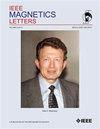Magnetic Full Adder Based on Negative Differential Resistance-Enhanced Anomalous Hall Effect
IF 1.1
4区 物理与天体物理
Q4 ENGINEERING, ELECTRICAL & ELECTRONIC
引用次数: 0
Abstract
Spintronic logic devices have attracted attention because of the prospect of breaking the von Neumann bottleneck through nonvolatile in-memory computing. Although varieties of spin Boolean logic gates have been proposed, spintronic arithmetic logic units such as adders have not been extensively studied because of the difficulties in application of the cascade method of CMOS-based logic in spintronic devices. We experimentally demonstrated a spintronic full adder based on the anomalous Hall effect and geometrical tuning magnetization switching driven by spin-orbit torque. The anomalous Hall effect of magnetic bits was enhanced by nonlinear elements with N-type negative differential resistance to control the基于负微分电阻增强反常霍尔效应的磁性全加器
自旋电子逻辑器件因有望通过非易失性内存计算打破冯·诺依曼瓶颈而备受关注。尽管已经提出了各种自旋布尔逻辑门,但由于CMOS逻辑的级联方法在自旋电子器件中的应用存在困难,诸如加法器之类的自旋电子算术逻辑单元尚未得到广泛研究。实验证明了一种基于反常霍尔效应和自旋轨道转矩驱动的几何调谐磁化切换的自旋电子全加器。通过具有N型负差分电阻的非线性元件来控制mosfet的导通/截止状态,从而增强了磁性位的反常霍尔效应,从而决定了存储器单元的写入电压。由于几何差异,随着写入电压的增加,存储单元中存储位的磁化被逐个切换。磁化切换的顺序导致存储器单元的异常霍尔电压对输入配置的响应符合全加法器的逻辑函数。全加器与存储器写入相结合的计算功能仅用七个磁位和两个步骤就通过实验实现了。磁性比特和时间步长的减少表明了我们设备的空间和时间效率,这对实际应用是有益的。
本文章由计算机程序翻译,如有差异,请以英文原文为准。
求助全文
约1分钟内获得全文
求助全文
来源期刊

IEEE Magnetics Letters
PHYSICS, APPLIED-
CiteScore
2.40
自引率
0.00%
发文量
37
期刊介绍:
IEEE Magnetics Letters is a peer-reviewed, archival journal covering the physics and engineering of magnetism, magnetic materials, applied magnetics, design and application of magnetic devices, bio-magnetics, magneto-electronics, and spin electronics. IEEE Magnetics Letters publishes short, scholarly articles of substantial current interest.
IEEE Magnetics Letters is a hybrid Open Access (OA) journal. For a fee, authors have the option making their articles freely available to all, including non-subscribers. OA articles are identified as Open Access.
 求助内容:
求助内容: 应助结果提醒方式:
应助结果提醒方式:


